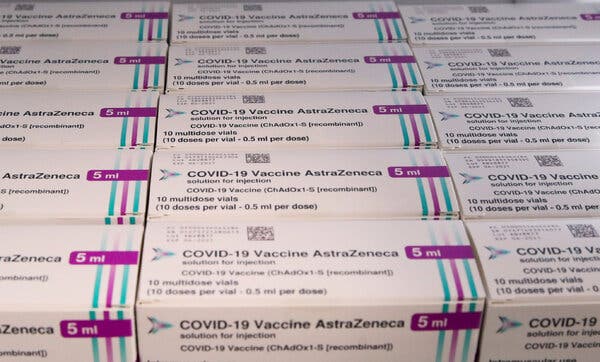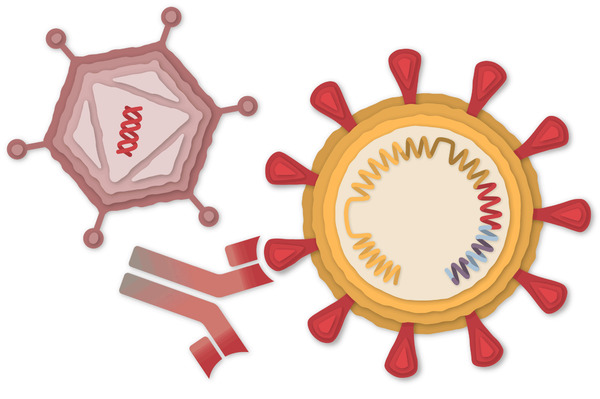Advertisement
Supported by
AstraZeneca Vaccine and Blood Clots: What Is Known So Far
In rare cases, an immune reaction has led to antibodies that caused a serious clotting disorder. But public health experts maintain the vaccine’s benefits far outweigh the risks for most people.

Benjamin Mueller and
The AstraZeneca-Oxford vaccine has been deployed against Covid-19 in at least 115 countries, some of them for several months now. But it wasn’t until a few cases of a rare blood-clotting disorder — some fatal — emerged within the past month or so that many European nations began to rethink its use across all age groups.
Several of those countries, well stocked with alternate vaccines, have now limited use of the AstraZeneca-Oxford shot to older people, and a few have stopped using it altogether. While the incidence of these clotting disorders is extremely low, regulators and researchers are trying to raise public awareness of certain symptoms — including headaches, leg swelling and abdominal pain — especially in younger people who have been vaccinated.
Public health experts, however, have expressed concern that publicity surrounding the rare vaccine-related reactions will fuel hesitancy, a particular problem in Europe. They continue to emphasize that the AstraZeneca-Oxford vaccine’s benefits far outweigh the risks. In many nations, it is the only vaccine available.
Below are some frequently asked questions.
What is a blood clot and what causes them generally?
A blood clot is a thickened, gelatinous blob of blood that can block circulation. Clots form in response to injuries and can also be caused by many illnesses, including cancer and genetic disorders, certain drugs and prolonged sitting or bed rest. Covid itself can trigger serious clotting problems. Clots that form in the legs sometimes break off and travel to the lungs or, rarely, to the brain, where they can be deadly.
The clots in recipients of the AstraZeneca-Oxford vaccine have drawn heightened concern because of their unusual constellation of symptoms: blockages in major veins, often those that drain blood from the brain, combined with low platelet counts. Platelets are a blood component involved in clotting.
Researchers in Germany and Norway found that vaccine recipients who developed the clotting disorder had produced antibodies that activated their platelets and led to the clots. The scientists suggested naming the unusual reaction “vaccine-induced immune thrombotic thrombocytopenia,” or VITT.
So far, researchers in Europe have not identified any underlying medical condition among the vaccine recipients who developed severe clotting issues that would help explain their susceptibility.
Some health officials have said that younger people appear to be at slightly higher risk from the clots. Because those people are also less likely to develop severe Covid, regulators said, any vaccine being given in that age group has to clear a higher safety bar.
What is the frequency of unusual cases in Europe?
As of April 4, European regulators had received reports of 222 cases of the rare blood-clotting problem in Britain and the 30-nation European Economic Area (the European Union plus Iceland, Norway and Liechtenstein). They said that about 34 million people had received the AstraZeneca vaccine in those countries, and that the clotting problems were appearing at a rate of about one in 100,000 recipients.
European regulators said that as of March 22, they had carried out detailed reviews of 86 cases, 18 of which had been fatal.
British health officials have described a somewhat lower incidence of cases, perhaps as a result of having begun their rollout of the vaccine in older people, who they say appear to be less susceptible.
But they offered evidence this week that the risk of being admitted to intensive care with Covid exceeded the dangers of the blood clots in almost every scenario. The only group for whom they said the risk of the clotting problems outstripped that of coronavirus-related intensive care admissions was people under 30 living in a place with low rates of Covid cases.
People of all ages with a medium or high risk of exposure to Covid were more likely to suffer serious health problems from catching the virus than from being given the vaccine, they said.
What actions are Britain, European countries and other nations taking as a safety precaution?
Germany, the Netherlands, the Philippines, Portugal and Spain have recommended that the AstraZeneca vaccine be given only to people over 60. Canada and France have limited it to those over 55; Australia, over 50; and Belgium, over 56. Britain, where the AstraZeneca vaccine was developed, has been its staunchest defender, but announced on Wednesday that it would begin offering alternative shots to people under 30.
Denmark and Norway have stopped using the vaccine, and the Democratic Republic of Congo delayed the start of its inoculation program.
Full vaccination with the AstraZeneca vaccine requires two doses, but regulators in France have recommended that people under 55 who have had one dose get a different vaccine for their second shot. German health officials have recommended the same for people under 60.
The AstraZeneca vaccine is not authorized for use in the United States, but the company has said it would seek Food and Drug Administration review.
On Wednesday, the European Medicines Agency said that the vaccine’s labeling should be revised to include the clotting disorder as a “very rare” side effect of the vaccine.
How common are blood clots?
In the United States, 300,000 to 600,000 people a year develop blood clots in their lungs or in veins in the legs or other parts of the body, according to the Centers for Disease Control and Prevention.
Based on that data, about 1,000 to 2,000 blood clots occur in the U.S. population every day. With several million people a day now being vaccinated, some of those clots will occur in those receiving the shots just as part of the normal background rates, unrelated to the vaccine.
In Britain, regulators have said, roughly one in 1,000 people are affected by a blood clot in a vein every year.
But medical experts said it was harder to discern the typical background rate of the more unusual clotting cases being observed in small numbers of recipients of the AstraZeneca-Oxford vaccine. Cerebral venous thrombosis, or clotting in the brain, has not always been well diagnosed, researchers have said.
Still, German researchers have said those clots were appearing more frequently in recipients of the AstraZeneca-Oxford vaccine than would be expected in people who had never received the shot.
What symptoms should doctors and vaccine recipients look for in case of an adverse reaction like blood clots?
European regulators had recommended that recipients of the vaccine seek medical assistance for a number of possible symptoms, including swelling in the leg, persistent abdominal pain, severe and persistent headaches or blurred vision, and tiny blood spots under the skin beyond the area where the injection was given.
But that set of symptoms was so vague that almost immediately, British emergency rooms experienced a surge in patients who were worried that they fit the description. As a result, some emergency room doctors have asked for more central guidance about how to handle what they described as largely unnecessary hospital visits.
German researchers have described specialized blood tests that can be used to diagnose the disorder, and suggested treatment with a blood product called intravenous immune globulin, which is used to treat various immune disorders.
Drugs called anti-coagulants, or blood thinners, can also be administered, but not a commonly used one — heparin — because the vaccine-related condition is very similar to one that occurs, rarely, in people given heparin.
Do vaccines cause other bleeding disorders?
Other vaccines, particularly the one given to children for measles, mumps and rubella, have been linked to temporarily lowered levels of platelets, a blood component essential for clotting.
Lowered platelet levels have been reported in small numbers of patients receiving the Moderna, Pfizer-BioNTech and AstraZeneca vaccines. One recipient, a physician in Florida, died from a brain hemorrhage when his platelet levels could not be restored, and others have been hospitalized. U.S. health officials have said that the cases are being investigated, but they have not reported the findings of those reviews and have yet to indicate that there is any link to the vaccines.
What has been the impact in Europe?
Shortly after the safety concerns emerged last month, surveys began to show that in Germany, France and Spain, a majority of people doubted the safety of the AstraZeneca-Oxford vaccine.
Use of the shot has suffered: Across Europe, 64 percent of delivered doses of AstraZeneca’s vaccine have been injected into people’s arms, markedly lower than the rates for other shots.
But European countries have been able to withstand restricting use of the vaccine because they have purchased shots from other makers, too. The European Union is expecting the arrival of 360 million doses of coronavirus vaccines in the second quarter of this year, much of that the Pfizer-BioNTech vaccine, which is becoming a bigger part of the continent’s rollout.
And in many cases, people on the continent still eligible to receive the AstraZeneca-Oxford vaccine were eager to get it. Germany, for instance, where the vaccine is recommended only for people over 60, has administered shots at a fast clip since the new restrictions were put in place.
Advertisement

